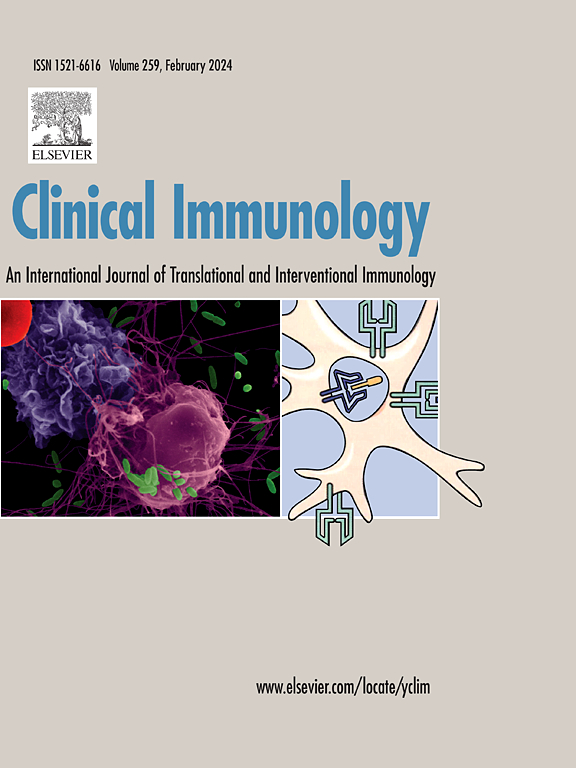Increased levels of Foxp3+CD4+NKT-like cells are associated with HIV disease progression
IF 3.8
3区 医学
Q2 IMMUNOLOGY
引用次数: 0
Abstract
Persistent immune activation is a key factor contributing to AIDS progression and non-AIDS-associated complications. NKT-like cells were found to exert immunosuppressive roles under some pathological situations by Foxp3 upregulation. Here, we found that Foxp3 was mainly expressed on CD4+NKT-like cells in untreated people living with HIV (PLWH) and the frequencies of Foxp3+CD4+NKT-like cells were correlated with HIV disease progression. Furthermore, the percentage of Foxp3+CD4+NKT-like cells was positively associated with immune activation and systematic inflammation. Foxp3+CD4+NKT-like cells might exert immunomodulatory effects by elevating the expression of TGF-β, IL-10, CD39, CD25, GITR, Ki67 and TIGIT. However, our analyses further identified Foxp3+CD4+NKT-like cells as a distinct subset that differed from conventional regulatory T cells. Notably, patients with higher baseline levels of Foxp3+CD4+NKT-like cells had a greater risk of poor immune reconstitution. These findings emphasized the importance of Foxp3+CD4+NKT-like cells during HIV infection and revealed its predictive role in immune reconstitution.
Foxp3+CD4+ nkt样细胞水平升高与HIV疾病进展相关。
持续的免疫激活是导致艾滋病进展和非艾滋病相关并发症的关键因素。在某些病理情况下,发现nkt样细胞通过Foxp3上调发挥免疫抑制作用。在这里,我们发现Foxp3主要在未经治疗的HIV感染者(PLWH)的CD4+ nkt样细胞上表达,并且Foxp3+CD4+ nkt样细胞的频率与HIV疾病进展相关。此外,Foxp3+CD4+ nkt样细胞的百分比与免疫激活和系统性炎症呈正相关。Foxp3+CD4+ nkt样细胞可能通过提高TGF-β、IL-10、CD39、CD25、GITR、Ki67、TIGIT的表达而发挥免疫调节作用。然而,我们的分析进一步确定Foxp3+CD4+ nkt样细胞是一个不同于传统调节性T细胞的独特亚群。值得注意的是,Foxp3+CD4+ nkt样细胞基线水平较高的患者免疫重建不良的风险更大。这些发现强调了Foxp3+CD4+ nkt样细胞在HIV感染中的重要性,并揭示了其在免疫重建中的预测作用。
本文章由计算机程序翻译,如有差异,请以英文原文为准。
求助全文
约1分钟内获得全文
求助全文
来源期刊

Clinical immunology
医学-免疫学
CiteScore
12.30
自引率
1.20%
发文量
212
审稿时长
34 days
期刊介绍:
Clinical Immunology publishes original research delving into the molecular and cellular foundations of immunological diseases. Additionally, the journal includes reviews covering timely subjects in basic immunology, along with case reports and letters to the editor.
 求助内容:
求助内容: 应助结果提醒方式:
应助结果提醒方式:


